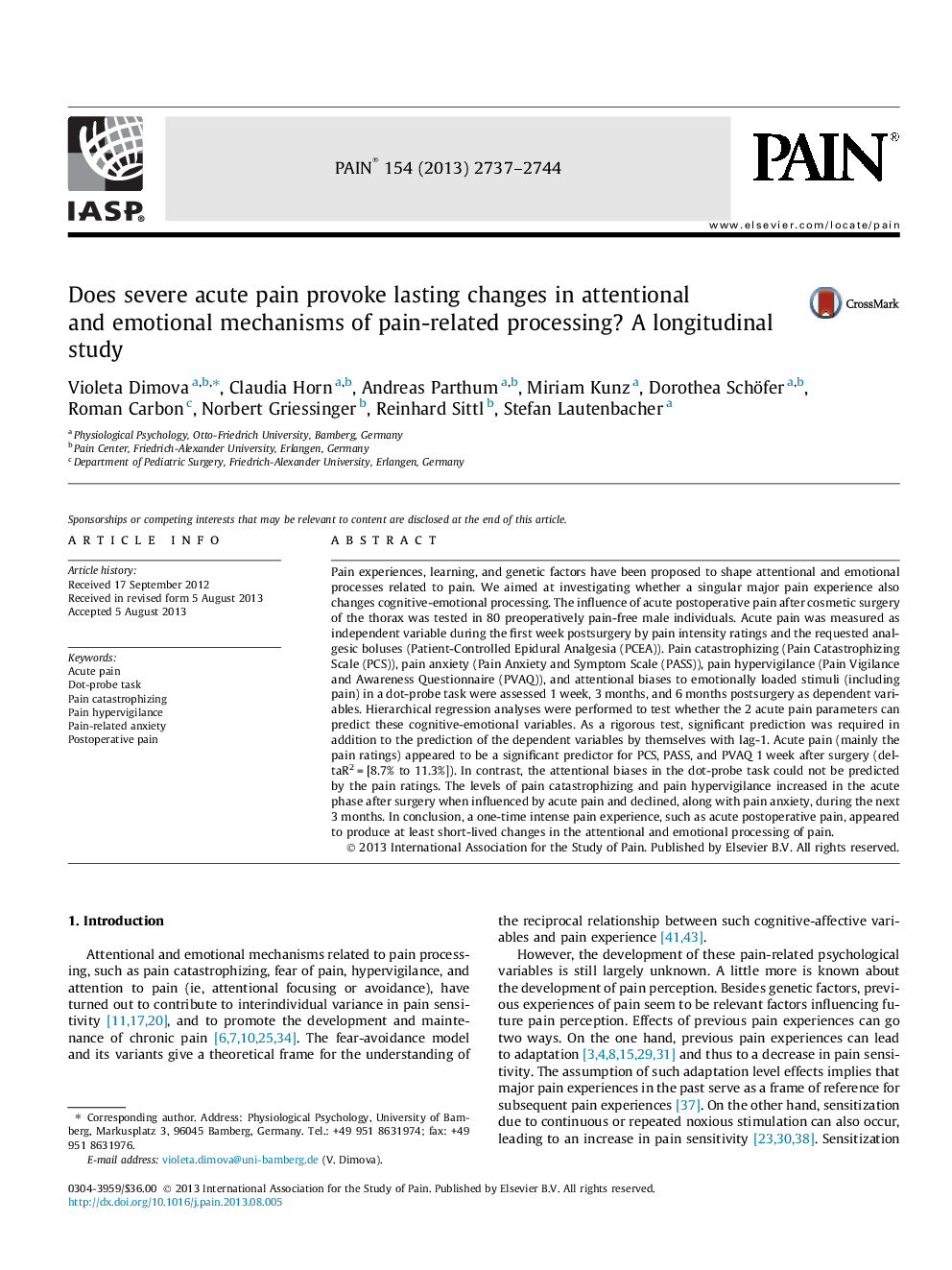| کد مقاله | کد نشریه | سال انتشار | مقاله انگلیسی | نسخه تمام متن |
|---|---|---|---|---|
| 10450054 | 918344 | 2013 | 8 صفحه PDF | دانلود رایگان |
عنوان انگلیسی مقاله ISI
Does severe acute pain provoke lasting changes in attentional and emotional mechanisms of pain-related processing? A longitudinal study
ترجمه فارسی عنوان
آیا درد حاد شدید موجب تغییرات دائمی در مکانیزم های توجه و عاطفی پردازش مرتبط با درد می شود؟ یک مطالعه طولی
دانلود مقاله + سفارش ترجمه
دانلود مقاله ISI انگلیسی
رایگان برای ایرانیان
کلمات کلیدی
درد حاد، کار دونده پروب، درد فاجعه آمیز، کمردرد درد اضطراب مرتبط با درد، درد پس از عمل،
موضوعات مرتبط
علوم زیستی و بیوفناوری
علم عصب شناسی
علوم اعصاب سلولی و مولکولی
چکیده انگلیسی
Pain experiences, learning, and genetic factors have been proposed to shape attentional and emotional processes related to pain. We aimed at investigating whether a singular major pain experience also changes cognitive-emotional processing. The influence of acute postoperative pain after cosmetic surgery of the thorax was tested in 80 preoperatively pain-free male individuals. Acute pain was measured as independent variable during the first week postsurgery by pain intensity ratings and the requested analgesic boluses (Patient-Controlled Epidural Analgesia (PCEA)). Pain catastrophizing (Pain Catastrophizing Scale (PCS)), pain anxiety (Pain Anxiety and Symptom Scale (PASS)), pain hypervigilance (Pain Vigilance and Awareness Questionnaire (PVAQ)), and attentional biases to emotionally loaded stimuli (including pain) in a dot-probe task were assessed 1Â week, 3Â months, and 6Â months postsurgery as dependent variables. Hierarchical regression analyses were performed to test whether the 2 acute pain parameters can predict these cognitive-emotional variables. As a rigorous test, significant prediction was required in addition to the prediction of the dependent variables by themselves with lag-1. Acute pain (mainly the pain ratings) appeared to be a significant predictor for PCS, PASS, and PVAQ 1Â week after surgery (deltaR2Â =Â [8.7% to 11.3%]). In contrast, the attentional biases in the dot-probe task could not be predicted by the pain ratings. The levels of pain catastrophizing and pain hypervigilance increased in the acute phase after surgery when influenced by acute pain and declined, along with pain anxiety, during the next 3Â months. In conclusion, a one-time intense pain experience, such as acute postoperative pain, appeared to produce at least short-lived changes in the attentional and emotional processing of pain.
ناشر
Database: Elsevier - ScienceDirect (ساینس دایرکت)
Journal: PAIN® - Volume 154, Issue 12, December 2013, Pages 2737-2744
Journal: PAIN® - Volume 154, Issue 12, December 2013, Pages 2737-2744
نویسندگان
Violeta Dimova, Claudia Horn, Andreas Parthum, Miriam Kunz, Dorothea Schöfer, Roman Carbon, Norbert Griessinger, Reinhard Sittl, Stefan Lautenbacher,
